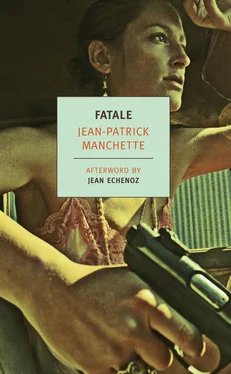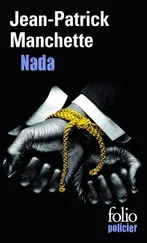Jean-Patrick Manchette - Fatale
Здесь есть возможность читать онлайн «Jean-Patrick Manchette - Fatale» весь текст электронной книги совершенно бесплатно (целиком полную версию без сокращений). В некоторых случаях можно слушать аудио, скачать через торрент в формате fb2 и присутствует краткое содержание. Год выпуска: 2011, ISBN: 2011, Издательство: New York Review Books, Жанр: Криминальный детектив, на английском языке. Описание произведения, (предисловие) а так же отзывы посетителей доступны на портале библиотеки ЛибКат.
- Название:Fatale
- Автор:
- Издательство:New York Review Books
- Жанр:
- Год:2011
- ISBN:978-1-59017-572-9
- Рейтинг книги:5 / 5. Голосов: 1
-
Избранное:Добавить в избранное
- Отзывы:
-
Ваша оценка:
- 100
- 1
- 2
- 3
- 4
- 5
Fatale: краткое содержание, описание и аннотация
Предлагаем к чтению аннотацию, описание, краткое содержание или предисловие (зависит от того, что написал сам автор книги «Fatale»). Если вы не нашли необходимую информацию о книге — напишите в комментариях, мы постараемся отыскать её.
Fatale — читать онлайн бесплатно полную книгу (весь текст) целиком
Ниже представлен текст книги, разбитый по страницам. Система сохранения места последней прочитанной страницы, позволяет с удобством читать онлайн бесплатно книгу «Fatale», без необходимости каждый раз заново искать на чём Вы остановились. Поставьте закладку, и сможете в любой момент перейти на страницу, на которой закончили чтение.
Интервал:
Закладка:
“Shit!” he exclaimed, and coming from him the profanity was startling. “Shit! That lunatic!”
The Rougneux, the Tobies, and senior manager Moutet all turned around at his words and scrutinized the crowd. Their attitudes bespoke anxiety and disgust. Aimée turned around too, her eyebrows slightly raised, and surveyed the gathering without seeing anything out of the ordinary. Sinistrat was all smiles. He lit a Craven A with a Zippo lighter.
“I don’t see anything,” said Mme Rougneux.
“No! No!” responded Lindquist. “He was there-outside.”
“I don’t see him.”
“He’s not there now. He must have gone off to plan more mischief.”
“It’s simply outrageous,” said Rougneux. “I don’t understand how they could have let him out. Those doctors are idiots. Their clinics are a joke.” He spluttered after every sentence. He seemed mean, and pleased with himself.
“They are all drug addicts, leftists and that sort of thing,” said Tobie.
“Next time they ought to put him in an asylum,” said Mme Tobie.
“Be that as it may,” said Sinistrat, “don’t count on me to have him locked up.”
“But my dear man,” exclaimed Lindquist, irritated and contemptuous, “you might as well certify him as sane while you’re about it.”
“I’ll consider it.”
“What are you talking about?” asked Aimée.
Lindquist and the doctor turned towards her, both somewhat at a loss. For a moment neither said a word.
“Oh, nothing very interesting,” said Lindquist.
“A little conflict,” said Sinistrat with a slight flick of the hand.
“I love conflicts,” said Aimée, but just then applause erupted, for the town worthy had concluded his speech and everyone was facing the platform.
Immediately after this, the talk turned to other things, and, leaving the vin d’honneur to the porters and small fry, the big fish repaired to the cocktail party they had arranged.
[1] The last three were all renowned navigators and explorers.- Trans.
5
“That little doctor really has his nerve, it’s unconscionable,” said Lindquist as his sea-green Volvo slowly traversed the town with the realtor behind the wheel and Aimée seated at his side. The man shook his head. “Coming to the inauguration like that! And I bet you any money he’ll be at the cocktail party too! He used to work at L and L, you know. The company doctor, or some such. They were obliged to let him go. And now he spews out his nonsense in the newspaper.”
“He seems like a very rude man,” said Aimée sweetly.
“He’s a sort of nihilist,” answered Lindquist. “He votes for that Trotskyite Krivine, you know.”
“You don’t say,” answered Aimée.
“He’s crazy,” Lindquist explained in a definitive tone.
He parked the Volvo in a small triangular plaza. There was a fountain in the middle. The building façades on all three sides were cream and brown, with visible beams, or at least with illusory visible beams painted on them, and windows with little panes of thick glass and pots or planters of geraniums on their sills. One of the façades was that of a brasserie operating on two floors with its name, Grand Café de l’Anglais, painted in cream Gothic lettering on a brown background. Another was that of a private house, both halves of whose carriage entrance were open. There was much animation in the lobby, where two servants were relieving guests of their hats and coats. Lindquist and Aimée went through the hall and entered a large reception room crowded with people. A long trestle table had been set up, draped with a white cloth and set with a great many plates full of canapés. A white-jacketed server behind the table with his back to the wall busied himself with the spread.
There were about thirty people in the reception room. The women outnumbered the men. The Rougneux and the Tobies had already arrived. Just after Aimée and Lindquist, senior manager Moutet appeared with a voluptuous brunette. It was his wife. He introduced Aimée to her. The brunette Christiane Moutet had a vigorous handshake and a carnivorous smile and seemed at ease with herself.
“Do you play bridge?” she asked Aimée, and Aimée said yes. “At long last!” exclaimed the brunette delightedly. “We can never find a fourth who doesn’t screw everything up.”
“Oh, come on,” said senior manager Moutet.
“Oh phooey!” said the woman. “Pardon my language.”
Aimée smiled at her. Over the brunette’s shoulder she saw that Dr. Sinistrat had arrived and was standing near the entrance accompanied by a petite young woman with short hair who was wearing slacks. The doctor appeared to be looking for someone in the crowd. The petite woman looked unhealthy and uncomfortable. Twice she covered an ear with the palm of her hand.
“Oh look, here come our hosts,” said Lindquist, who was coming back from the buffet with flutes of champagne.
Aimée looked in the direction in which the realtor was pointing. At the far end of the reception room a group of people had just entered through a small side door: two men side by side, a woman just behind them, and another woman a couple of paces behind the first. Shaking hands and smiling, they made their way through guests filling up on sandwiches and champagne or whiskey and soda or vodka and orange juice. The woman at the back was a skinny blonde with pale eyes and long pale hair and hollows above the collarbone. She was wearing a shapeless pistachio-green dress adorned by a brooch set with rubies. Her eye caught Sinistrat’s and veered away immediately; Sinistrat likewise averted his gaze. Aimée watched him. She took a step sideways, as though trying to keep her balance, so as to get closer to Sinistrat and the petite woman in slacks.
“My ears hurt,” said the petite woman in slacks.
“Oh, give us a break, darling,” said Sinistrat. “It’s psychosomatic.”
He wandered off towards the back of the room. Moments later, Aimée saw him talking to the pale-eyed blonde woman, smiling and handing her a glass of orange juice. Lindquist took Aimée’s arm.
“Come, dear Madame Joubert,” he said, “let me introduce Monsieur Lorque and Monsieur Lenverguez, the pillars of Bléville’s prosperity.”
“I’m just the man with the little jars,” said Lorque.
He and Lenverguez were probably sixty years old. They were both stout. Lorque, the fatter of the pair, was very fat, with skin as smooth as a baby’s and brownish eyelids and a gold chain on his royal-blue vest. Lenverguez was tall and stiff, with a crown of white hair, a strong nose and a severe gaze, beads of sweat on his brow, well-scrubbed fingers and nails square and manicured. Lorque and Lenverguez were smoking Havana cigars.
“Little jars?” asked Aimée.
“Little jars of baby food,” replied Lorque. “Happy Baby baby food, Old Sea-Pilot canned goods, and L and L cattle feed-that’s us.” He looked pointedly at Aimée, teeth slightly exposed and head bent a little forward, as though he was saying something provocative. “He is the head,” he added, digging Lenverguez in the ribs. “And I am the stomach. Better watch out. I swallow everything I touch.”
“I won’t let you touch me then,” said Aimée.
“That’s a good one,” observed Lorque.
“Pay no attention to him,” said the woman who was with the two men. “He loves to play the gangster.”
“My wife,” declared Lorque without turning his head.
Lenverguez looked around and shook his head.
“Where has mine gone?” he asked vaguely. He had a lisp and spoke rarely. He went off grumbling in search of the pale-eyed blonde, but she was no longer in the room. Nor, for that matter, was Dr. Sinistrat.
Читать дальшеИнтервал:
Закладка:
Похожие книги на «Fatale»
Представляем Вашему вниманию похожие книги на «Fatale» списком для выбора. Мы отобрали схожую по названию и смыслу литературу в надежде предоставить читателям больше вариантов отыскать новые, интересные, ещё непрочитанные произведения.
Обсуждение, отзывы о книге «Fatale» и просто собственные мнения читателей. Оставьте ваши комментарии, напишите, что Вы думаете о произведении, его смысле или главных героях. Укажите что конкретно понравилось, а что нет, и почему Вы так считаете.












